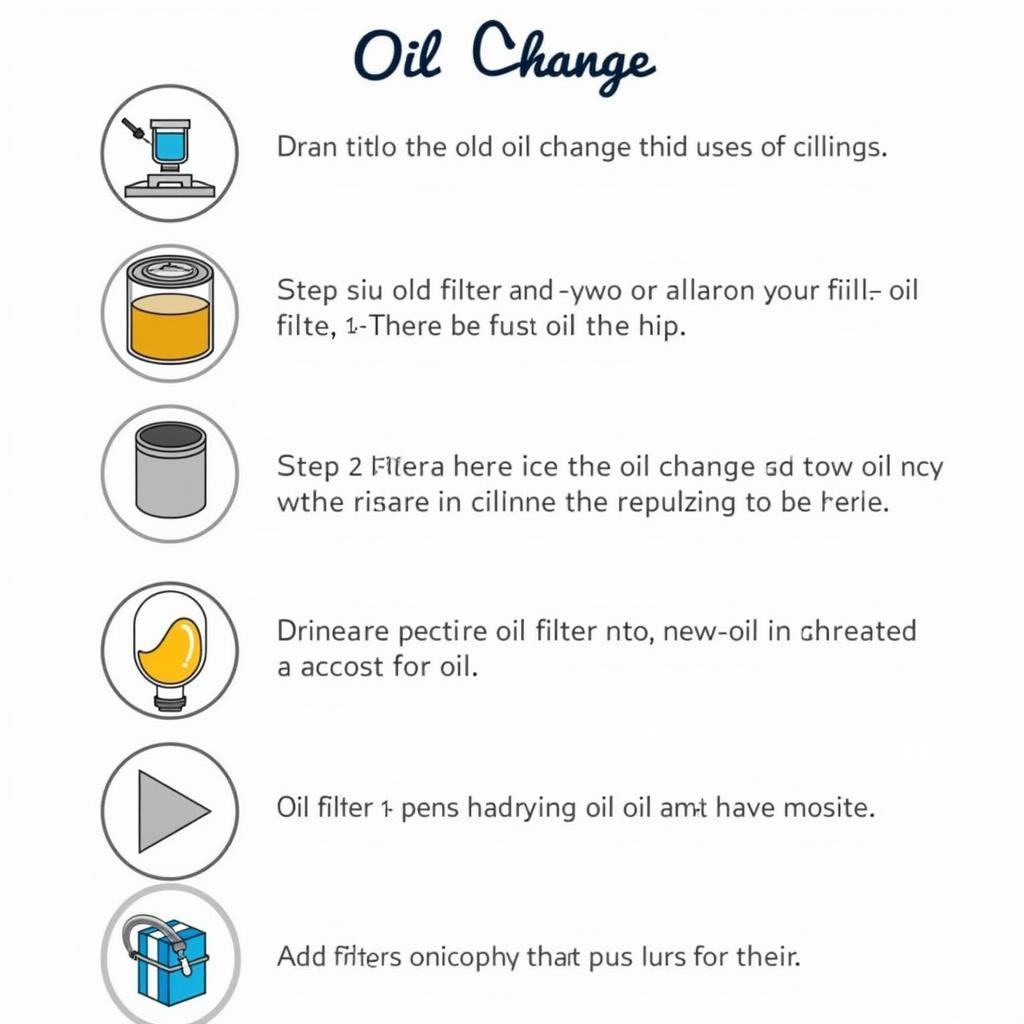Car Maintenance Versus Oil Change – two terms often used interchangeably, but are they the same? Understanding the distinction is crucial for keeping your vehicle in top shape and avoiding costly repairs down the line. While an oil change is a vital part of car maintenance, it’s just one piece of the larger puzzle. Let’s dive into the specifics and clear up any confusion.
What Does Car Maintenance Encompass?
Car maintenance involves a series of regular checks, adjustments, and replacements aimed at preserving your vehicle’s performance, safety, and longevity. Think of it as a holistic approach to car care, encompassing everything from routine checks like tire pressure and fluid levels to more complex procedures like brake pad replacements and transmission fluid changes. A comprehensive car maintenance schedule considers factors like mileage, driving conditions, and the manufacturer’s recommendations. Curious about maintenance costs for different vehicle types? Compare truck vs car maintenance costs for a clearer picture.
Key Components of a Car Maintenance Schedule:
- Regular Oil Changes: This is the cornerstone of car maintenance, ensuring proper engine lubrication and preventing premature wear.
- Tire Rotation and Balancing: Essential for even tire wear, extending tire life, and improving fuel efficiency.
- Brake Inspections and Replacements: Crucial for safety, involving checking brake pads, rotors, and calipers for wear and tear.
- Fluid Checks and Changes: Ensuring proper levels and quality of essential fluids like coolant, transmission fluid, and brake fluid.
- Filter Replacements: Replacing air filters, cabin air filters, and fuel filters to maintain optimal engine performance and air quality.
- Belt and Hose Inspections: Checking for signs of wear, cracks, or leaks in belts and hoses.
- Spark Plug Replacement: Essential for proper ignition and fuel efficiency.
- Battery Testing and Replacement: Ensuring a reliable starting system.
Why is Regular Car Maintenance Important?
Regular car maintenance is not just about keeping your car running smoothly; it’s about ensuring your safety and saving money in the long run. Neglecting maintenance can lead to costly repairs, decreased fuel efficiency, and potentially dangerous driving conditions. Think of preventative maintenance as an investment in your vehicle’s future. Wondering how long does regular car maintenance take? Check out our guide for a better understanding.
Car Maintenance vs. Oil Change: A Direct Comparison
While an oil change is a vital aspect of car maintenance, it’s just one piece of the puzzle. Car maintenance encompasses a much broader range of services designed to address all aspects of your vehicle’s health. Imagine your car as a complex machine with many interconnected parts – an oil change keeps the engine lubricated, but other components like brakes, tires, and fluids require attention too.
What Happens During an Oil Change?
During an oil change, the old engine oil is drained and replaced with fresh oil. The oil filter, which removes contaminants from the oil, is also typically replaced. This process ensures proper engine lubrication, preventing friction and wear on internal components.
 Oil Change Process Steps
Oil Change Process Steps
How Often Should You Get an Oil Change?
The recommended oil change frequency varies depending on factors like your vehicle’s make and model, driving conditions, and the type of oil used. Consult your owner’s manual for specific recommendations. As a general guideline, most vehicles require an oil change every 3,000 to 5,000 miles or every 3 to 6 months. Electric cars have different maintenance needs; learn more about electric cars cost of maintenance. For additional resources and information, you can also check car maintenance edmunds.
Maximizing Your Car’s Lifespan Through Proper Maintenance
Investing in a regular car maintenance schedule is the most effective way to maximize your vehicle’s lifespan and avoid costly repairs. By addressing minor issues before they escalate into major problems, you can save yourself time, money, and frustration in the long run. Considering a maintenance package? Discover how good is a maintenance car package for a better understanding of the benefits.
Conclusion: Prioritizing Both Car Maintenance and Oil Changes
Car maintenance and oil changes are both essential for keeping your vehicle in optimal condition. While an oil change is a vital component of maintenance, it’s not the only one. A comprehensive maintenance schedule addresses all aspects of your vehicle’s health, ensuring its longevity, performance, and safety.
For personalized advice and assistance with your car maintenance needs, feel free to reach out to us. We are here to help! Contact AutoTipPro at +1 (641) 206-8880 or visit our office at 500 N St Mary’s St, San Antonio, TX 78205, United States.
FAQs
- Is it okay to go over the recommended mileage for an oil change? While not ideal, going slightly over the recommended mileage is unlikely to cause immediate damage. However, consistently exceeding the recommended interval can lead to engine wear and decreased performance.
- What are the signs of a needed oil change? Common signs include dark or dirty oil, unusual engine noises, and decreased fuel efficiency.
- Can I perform car maintenance myself? Some basic maintenance tasks, like checking fluid levels and tire pressure, can be performed at home. However, more complex procedures require specialized tools and expertise.
- How often should I rotate my tires? Tire rotation is typically recommended every 5,000 to 8,000 miles.
- Why is my check engine light on? The check engine light can indicate a wide range of issues, from a loose gas cap to a more serious engine problem. It’s essential to have the issue diagnosed by a qualified mechanic.
- What are the benefits of regular brake inspections? Regular brake inspections ensure the safety and proper functioning of your braking system, preventing potential accidents.
- How can I improve my car’s fuel efficiency? Regular car maintenance, proper tire inflation, and avoiding aggressive driving habits can all contribute to improved fuel efficiency.





Leave a Reply